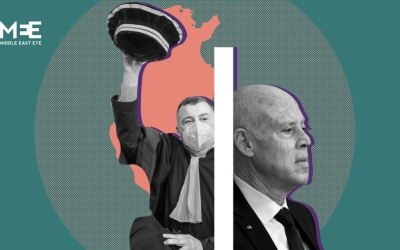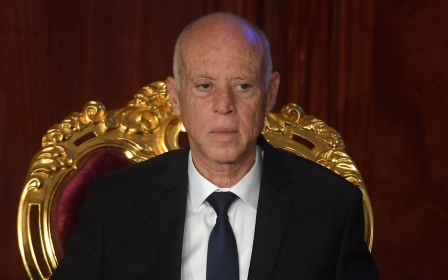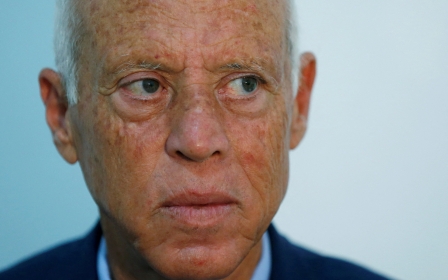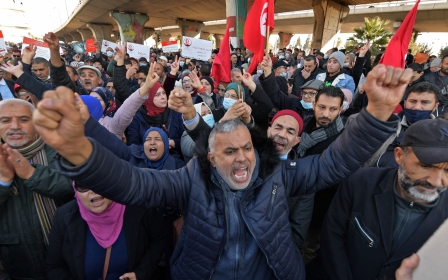Tunisia: Protests after president gives himself unprecedented power on judiciary
Tunisia's President Kais Saied cemented his grip over the judiciary on Sunday by issuing a decree that grants him control over the selection and promotion of judges.
The decree comes months after Saied suspended parliament and assumed executive powers in a move seen by critics as a coup.
The announcement early on Sunday sparked protests in the capital Tunis, with hundreds of demonstrators taking to the street to voice their fears for an independent judiciary.
"Shut down the coup... take your hands off the judiciary," some chanted as they gathered in central Tunis.
New MEE newsletter: Jerusalem Dispatch
Sign up to get the latest insights and analysis on Israel-Palestine, alongside Turkey Unpacked and other MEE newsletters
"This coup is back to fabricating accusations, inciting violence against Tunisians, inciting against [civil society] organisations and parties, the hate speech that we hear and the division we live in, and today we came out to say enough, wake up Tunisians, wake up," Tunisian protester Mariem Bennour told Reuters news agency.
The Sunday decree established a temporary new council, with no fixed term, to oversee the judiciary.
The new "Temporary Supreme Judicial Council" will be partly appointed by the president, and gives him the right to dismiss "any judge failing to do his professional duties", or object to the promotion or nomination of any judges.
Saied will be responsible for proposing judicial reforms, according to the new decree, which also stipulated that judges had no right to go on strike.
'Today we came out to say enough, wake up Tunisians, wake up'
- Tunisian protester
"It is forbidden for judges of all ranks to go on strike or hold any organised collective action that could disturb or delay the normal working of the courts," the decree read.
The new announcement effectively gives Saied sole power over the entire justice system.
The former constitutional law professor has already seized absolute control over both executive and legislative authority, and his critics accuse him of seeking dictatorial powers and undermining rule of law.
The new decree came a week after Saied said he would dissolve the Supreme Judicial Council (CSM), a body tasked with ensuring the independence of the judiciary seen as the “last line of defence to his one-man rule”.
After abolishing the CSM, a nationwide two-day strike was observed amid mounting criticism of Saied at home and abroad.
Months-long dispute
Last week, Saied said his move on the CSM was meant to "purify" the justice system, blasting members of the council and accusing some judges and magistrates of corruption and stalling proceedings in several cases.
He repeatedly reiterated his commitment to respecting the independence of the judiciary, saying that he "does not want to control all power".
But critics are unconvinced, fearing that Saied is persisting with plans to undermine the justice system.
Tunisia's Union of Administrative Judges said Sunday's decree "represents a flagrant violation of the separation of powers".
"Exceptional measures do not justify interfering in the constitutional framework of the judiciary," it said, urging judges to boycott the new council.
Said Benarbia, the regional director of the International Commission of Jurists, told AFP that the decree "enshrines the subordination of the judiciary to the executive".
"If implemented, it would effectively end judicial independence and the separation of powers in Tunisia, and, with it, the democratic experiment in the country," he said.
"It gives the president wide-ranging powers to manage the careers of judges, in particular to suspend or remove them. This violates the most basic principles of the rule of law, the separation of powers and judicial independence."
The president's relations with the judiciary have been on edge since he consolidated power in July last year.
At the time, he declared himself the chief prosecutor, a move rejected by the CSM. Since then, the legal body has come under increasing scrutiny from the president.
On multiple occasions, Saied blamed the council for failing to resolve high-profile cases, including the political assassination of left-wing leaders in 2013.
He also accused it of appeasing political forces within the country, namely Islamist-leaning factions like Ennahda, the biggest party in the suspended parliament.
Opposition groups rejected Saied's charges, accusing him of trying to use the high-profile cases of political assassination as a guise to expand his powers and crush opponents.
Middle East Eye delivers independent and unrivalled coverage and analysis of the Middle East, North Africa and beyond. To learn more about republishing this content and the associated fees, please fill out this form. More about MEE can be found here.





